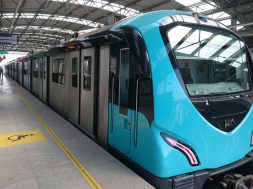Innovative metro projects enhance connectivity across India

India’s metro network reaches significant milestones, promoting urban mobility through innovative projects, international collaborations, and ground-breaking transportation solutions.
Prime Minister Narendra Modi made significant strides in improving India’s metro network, making it more powerful and modern. He laid the groundwork for several development projects worth more than ₹ 12,200 crores in Delhi, including the opening of a 13-kilometre portion of the Delhi-Ghaziabad-Meerut Namo Bharat corridor, which will considerably improve travel between Delhi and Meerut. In addition, the PM inaugurated a 2.8-kilometre portion of Delhi Metro Phase IV, benefiting West Delhi, and laid the groundwork for the 26.5-kilometre Rithala-Kundli line, which will boost the connection between Delhi and Haryana.
These initiatives mark a significant milestone in transport, with metro systems now covering longer distances and serving over 1 crore passengers daily. With this trend, India will have surpassed Japan’s Metro Rail Projects by 2022. India currently ranks third in the world regarding operational metro network length, and it is on course to become the world’s second-largest metro network.
Milestones in the history of the metro in India
Metro corridors and lanes have transformed urban mobility in India, starting decades ago. The Delhi Metro initiated the concept of a metro system in 1969, but the first step took nearly two decades to come to fruition. In 1984, India’s first metro line, spanning 3.4 kilometres between Esplanade and Bhowanipur, opened in Kolkata, ushering in metro life in the country. The Delhi Metro Rail Corporation (DMRC) was created in 1995 to bring world-class mass rapid transportation to Delhi through a partnership between the Central Government and the Government of Delhi.
The DMRC opened its first metro corridor in 2002, connecting Shahdara and Tis Hazari, paving the way for one of India’s largest metro networks. Bengaluru’s Namma Metro began construction in 2011, while Chennai’s metro expanded in 2017 with the opening of its first underground stretch on the Green Line, connecting Koyambedu to Nehru Park, a significant milestone in Southern India’s metro growth. The Kochi Metro Phase 1 was completed in 2020, with the commissioning of the Thykoodam-Petta line, bringing Kerala into the developing metro network. These achievements in large cities served as the foundation for India’s vast and efficient metro system, which now connects millions of people.
Innovations in metro systems
India’s metro expansion is going beyond land-based transportation to include creative future solutions. From under-river tunnels to autonomous trains and water metros, India is setting new norms for modern urban transportation.
Under-Water Metro: In 2024, PM Modi opened India’s first underwater metro tunnel in Kolkata, where the Esplanade-Howrah Maidan segment runs beneath the Hoogly River. This astonishing feat demonstrates India’s engineering potential.
Driverless Metro: On December 28, 2020, India began its first driverless metro service on Delhi Metro’s Magenta Line, setting a new standard for automation in public transport.
Kochi Water Metro: Kochi, Kerala, was the first city in India to start a Water Metro Project, which connects 10 islands around the city with electric hybrid boats. This ground-breaking effort will enable seamless connectivity, with the first boat set to launch in December 2021.
The sanctioning of three metro rail projects is a big step forward for India’s urban transportation development. The Bengaluru Metro Project is a 44-kilometre expansion that includes two lines and aims to improve city connections. The Thane Metro Project offers a 29-kilometre network to reduce traffic congestion in Thane, while the Pune Metro Project contains a 5.5-kilometre track to improve urban mobility in the city. Along with this domestic achievement, India’s skill in metro rail systems has garnered increasing international attention.
The Delhi Metro Rail Corporation (DMRC) is now overseeing the development of a metro system in Bangladesh and has provided consulting services in Jakarta. Countries including Israel, Saudi Arabia (Riyadh), Kenya, and El Salvador are also looking into collaborating with DMRC on metro construction projects.
For more details, visit: https://delhimetrorail.com/
Cookie Consent
We use cookies to personalize your experience. By continuing to visit this website you agree to our Terms & Conditions, Privacy Policy and Cookie Policy.







